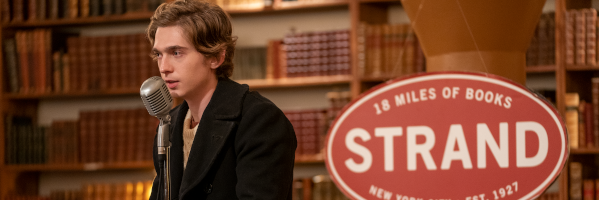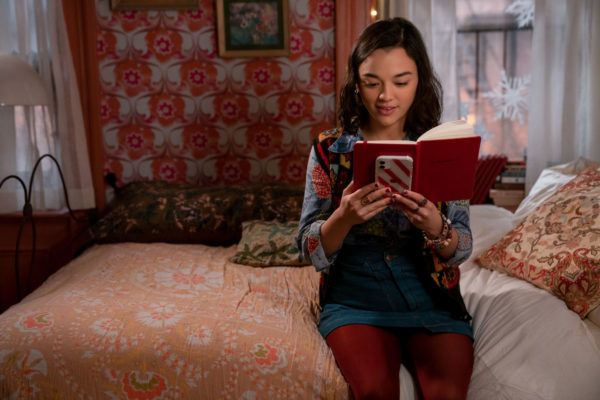When the calendars roll around to November 1st, many folks immediately enter Christmas mode and start planning — or even starting – their marathons of Christmas movies to watch over the next two months. The best Christmas stories endure not just because they’re filled with lights and trees and presents, but because they get at that thing that makes the holiday season so special, telling the people you love how much you love them. That’s present in Elf and It’s a Wonderful Life and Home Alone, and it’s certainly a key part of why Dash & Lily – a full-on Christmas TV series on Netflix —works as well as it does. While it can get a bit too cutesy and twee at times, thanks to its charming leads, sophisticated writing, and cinematic storytelling, Dash & Lily is ultimately a winner.
This new eight-episode Netflix series is based on the young adult book series Dash & Lily’s Book of Dares by David Levithan and Rachel Cohn, and produced by Shawn Levy of Stranger Things fame. But in terms of tone it’s like a slightly more mature Love, Simon. The show is a romantic comedy at heart, and it switches back and forth between two New York City teenaged strangers’ points of view. Austin Abrams plays Dash, a cynical, smart, and charming high schooler who stumbles upon a diary in Strand Bookstore that sends him on a scavenger hunt ultimately leading to a dare. He completes it, and feeling an unexpected (and overwhelming) sensation of joy decides to write back and return the diary to where he found it.
On the other end of the diary is Lily (Midori Francis), a cheerful, somewhat naïve high schooler who flirts with the “Manic Pixie Dream Girl” archetype but thankfully never fully goes there (more on that in a bit). Lily started the diary after being egged on by her brother Langston (Troy Iwata) as a way to maybe find some friends her age (she leads a diverse choir group of adults) or even a romantic partner. Lily is unsure about the idea at first, but then embraces it, and through their back and forth makes it abundantly clear to Dash that Christmas is her favorite time of year.
The first two episodes of Dash & Lily are each focused on a single character’s POV (each episode is about 25 minutes long), serving as a really compelling entry point to the central premise, and from there their stories intertwine as they pass the diary back and forth without ever actually meeting in person. Lily’s dares force Dash to shake off his grumpiness and embrace a more joyful demeanor, while Dash’s dares force Lily to break out of her own world and more fully interact with those around her. And wouldn’t you know it, the two start to get genuine feelings for one another.
Complications ensue that I won’t get into so as not to spoil the twists and turns, but needless to say Dash & Lily wears its influences on its sleeve — most notably charming romcoms like Sleepless in Seattle with a dash of (500) Days of Summer flavor for good measure. In truth, especially in the first few episodes, I was most reminded of the final 30 minutes or so of Cameron Crowe’s complicated (albeit underrated) 2005 film Elizabethtown. You know, the part where Kirsten Dunst’s character plans Orlando Bloom’s character a road trip complete with a killer soundtrack? That’s kind of the vibe of the first few episodes of Dash & Lily – disarming and sweet and a little bit cheesy, but you can’t help but get wrapped up in it all.
And yes, Elizabethtown was the film that spawned the term “Manic Pixie Dream Girl” as shorthand for a female character who’s “quirky” and “odd” and mainly serves to break the male character out of his shell. But Dash & Lily largely avoids this pitfall as, in its later episodes, it refreshingly acknowledges the notion that these two characters have built the perfect (i.e. unrealistic) versions of one another in their heads, and that’s something with which they have to reckon.
The series is charming as all get-out thanks to a swell marriage between its performers, filmmakers, and writers all working in lockstep towards just the right tone. Abrams (who you may know from Brad’s Status or The Walking Dead) is compelling and amiable without being too overly confident — he plays the character as less a “hard-hearted cynic” and more a normal teenager, which keeps Dash from feeling, well, douche-y. And Francis manages to make Lily feel dimensional beyond her joyfully optimistic exterior. These characters are complicated because humans are complicated, and that makes a big difference in contrast to some other romcoms with less staying power.
The filmmaking, too, is warm and cinematic, highlighting the Christmas atmosphere in a way that comes off as organic and not syrupy (that is to say, this thankfully doesn’t feel like a Hallmark movie). It’s also incredibly specific to New York City geography, and the directors (who include Brad Silberling and Fred Savage) make terrific use of the city while keeping the show character-centric.
The series does begin to veer a bit too far into saccharine territory as it reaches its finale, and anyone who’s seen a romantic comedy can predict the specific story beats that will play out. But by and large, Abrams and Francis hold interest even when the comedy gets a bit too broad, and the show does a nice job of addressing the families of both Dash and Lily and how they’ve shaped their outlook on Christmas – and their individual growth going forward.
As far as romantic comedies go, Dash & Lily doesn’t break the mold but it does make a lasting impact. And in terms of Christmas stories, it finds the right balance between celebrating the holiday and acknowledging that sometimes life is still just hard. Dash & Lily is exactly as described — a Christmas romantic comedy — but you may be surprised to find just how hard you fall for its delightfully compelling characters.
Grade: B
Dash & Lily is now streaming on Netflix.




